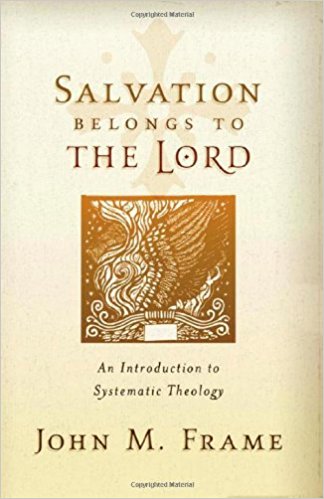Salvation Belongs to the Lord: An Introduction to Systematic Theology
- Approximate Time Commitment: 10 minutes
- Labels: Free
SALVATION BELONGS TO THE LORD: AN INTRODUCTION TO SYSTEMATIC THEOLOGY by John M. Frame focuses on theology from a Reformed perspective. This book review was written by Hank Griffith of South Suburban Evangelical Free Church in Apple Valley, Minnesota. Although many may not agree with every detail, it is good for those interested in theology and the Bible.
Resource Description
Full Review:
Salvation Belongs to the LORD is written by veteran theology professor, John M. Frame. The title comes from Psalm 3:8a “Salvation belongs to the LORD.” Though written in a conversational style, the book is a solid introduction to theology that grapples insightfully from a Reformed perspective with many deep biblical subjects. You won’t agree with every detail, but in general, I think you will find Salvation Belongs to the LORD richly biblical and quite edifying spiritually, even pastoral in tone.
Lord
A unique aspect of Frame’s treatment of systematic theology is his emphasis on God’s Lordship/Christ’s Lordship as a central theme in the Bible. He begins chapter one by explaining the great passage on the name by which God should be known (Ex. 3:13-15). By the way, if you ever doubt that the Lordship of God is a major theme of the Bible, turn in any concordance to the word “Lord.” It’s used thousands of times. You will find countless verses like, “I am the LORD” or “that they may know I am the LORD.”
Our Jewish friends often use Deuteronomy 6:4-5 as a kind of confession of faith: “Hear, O Israel, The LORD our God, the LORD is one.” The Christians of the New Testament also confessed Lordship: “Jesus is Lord” (Romans 10:9-10, 1 Cor. 12:3, and Phil. 2:11).
Frame points out that the word “Lord” especially connotes three important concepts: (1) His control or power over the whole universe, (2) His authority or right to be obeyed, and (3) His presence in which He takes creatures to be his own and promises to be with them. The author goes on to show aspects of this lordship triad as he discusses a number of biblical doctrines.
For example…
In the chapter on the work of Christ, Frame points out that in the Old Testament, there were three offices of people who were anointed with oil: prophets, priests, and kings. Jesus, when He came as the Messiah, fulfilled all three functions: Prophet, Priest, and King. He is the ultimate Prophet, the ultimate Priest, and the ultimate King. The author then relates these three roles to the lordship triad: as Prophet, Jesus displays especially the lordship attribute of authority; as Priest, the lordship attribute of presence; as King, the lordship attribute of control. These offices help us to understand Jesus’ work. As a Prophet, He brings us the true word of God. As Priest, He brings sacrifice (ultimately, the sacrifice is Himself) and makes intercession. And as King, He rules all things in his mighty power.
In closing…
Let me quote Frame on the very important subject of knowing God: “To know God is to know Him as Lord. Over and over, God says that He will do something that they ‘shall know that I am the LORD’ (Ex. 14:18; cf, 33:11-34:9; 1 Kings 8:43; 1 Chron. 28:6-9). That is a summary of what God wants us to know about Him, to know that He is Lord. That means … knowing his control, authority, and presence.
“You grow in knowledge of God as you know Him more and more as Lord, as King. First, He is the one who controls all things. You will grow in your knowledge of God as you see more and more things as under His control; the present, the future, your own life, your sin, your salvation. Perhaps you think now that there is some part of your life where you are in control. You will grow in your knowledge of God when you come to see that ultimately there is no part of your life that is controlled by anyone other than God, even that little part of your life.
“Second, you come to know God as the one who speaks with such authority that you MUST obey – in every area of your life: your social life, your moral life, even your intellectual life. You will grow in your knowledge of God when you come to bring every thought captive to Christ (2 Cor. 10:5).
“Third, you come to know God as you sense more and more his presence in your life. You can’t ever escape from Him. You can’t do anything that He doesn’t see. And nothing shall ever separate you from His love.”
H.G.
Only logged in customers who have purchased this product may leave a review.



Reviews
There are no reviews yet.